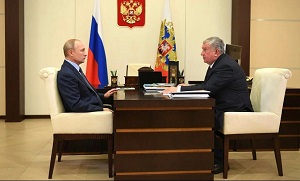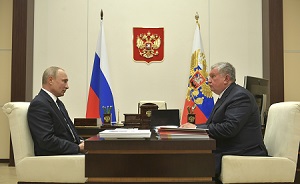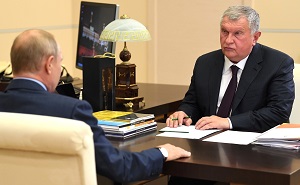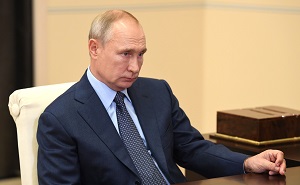Igor Sechin Reports to President of Russia about the Company’s Work in Current Market Conditions

 |
| Photo Credit: Press Service of the President of Russia |
Vladimir Putin has held a working meeting with Rosneft Oil Company Chief Executive Officer Igor Sechin.
While opening the meeting, Vladimir Putin highlighted the questions he would have liked to discuss, including Rosneft’s prospective projects, the Company’s work amidst the current restrictions because of the coronavirus pandemic, as well as oil production cuts under the OPEC+ deal. “This situation will run its course sooner or later, and economic growth will resume both internationally and in Russia. By the way, we may well expect the Russian economy to shrink less that in many other countries, including in Europe. We will see when we have the results for this year,” the President of Russia said.
According to Igor Sechin, Rosneft has been quite consistent in its efforts to deliver on the strategic development goals, accounting for about 6% of the global output.
“At the same time, we strictly abide by all the social commitments, despite the unfavourable environment created by the pandemic and the fall in oil price, as well as the illegitimate sanctions. Rosneft fuels Russia’s economic growth, since it accounts for about 8% of the country’s GDP, and 24% of the gross output within the manufacturing sector,” Rosneft CEO told.
The Company is vigorously promoting the development of human and technological potential. The Company employs more than 350,000 highly qualified specialists whose average salary is approximately twice the average pay across the country.
Rosneft is financing social projects, and a prime example is Tulun in the Irkutsk Region, where Rosneft built a school for 1,275 children in less than a year. “We have been in touch with them to coordinate the connection to utilities, roads, electricity, water and sewerage. It is the first school that has two simultaneously operating swimming pools, a wonderful gym, a library, an assembly hall and themed rooms. And on September 1, the school will open its doors to children,” Igor Sechin reported to the President.
The main priority of Rosneft during the pandemic is keeping the employees safe and healthy, the head of Rosneft noted. The Company has approved a system-wide coronavirus-response policy based on the best practices; a decision-making system for prompt measures is put together.
Rosneft monitors the situation at all its enterprises on a daily basis. More than 245,000 people have been already tested for coronavirus, and the number of telecommuters has been maximised wherever possible without compromising production. The Company has also developed measures in case the epidemiological situation worsens.
“We have deployed 137 observation facilities in places of rotational work, where nearly 17,000 workers arriving for the shift can stay; there are 332 isolation spaces where workers are being tested for COVID. Due to the constant monitoring of the epidemiological situation in all shift camps, we have contained the infection in almost all of the company’s production fields,” Sechin told to the President.
Working through the Cuts
 Sechin also reported about the work during the oil production cuts implemented under the OPEC+ agreement.
Sechin also reported about the work during the oil production cuts implemented under the OPEC+ agreement.
“As a result of the OPEC+ agreement you mentioned, Vladimir Vladimirovich, and in accordance with the instructions we received, the Company is indeed forced to temporarily cut production. We are working to minimise the socioeconomic impacts from the layoffs we just cannot avoid. We are trying to rank the oilfields by efficiency in order to minimise the losses and we are primarily cutting production at low-efficiency depleted fields,” the head of Rosneft said.
As an example, he cited the low-rate deposits on Sakhalin, especially Northern Chayvo, which currently employs about 2,000 people.
“Despite the production cuts, we plan on keeping our unique human resources on board, and not lay anyone off, not a single job,” Igor Sechin promised to the President. According to him, the period of limited oil production will be used to suspend wells and to build new logistics infrastructure, which will allow joining the world markets with greater efficiency when this period is over.
Crude from Sakhalin is being supplied to the Komsomolsk Refinery 600 kilometres away. “We have now connected the plant to the main ESPO oil pipeline from the south, and we will shut down the old pipe and build an access to the sea terminal in De-Kastri. This way the project will be as environmentally friendly as it can, to the highest degree, and will have direct access to world markets and ensure a more reliable supply of the Komsomolsk Refinery, which will certainly benefit consumers in the Far East,” Sechin told the President.
According to the head of Rosneft, “in a year and a half or two years, this field will return to regular operation, and for the time being, its personnel will be involved in rearranging routes, in the mothballing of wells and in other projects.”
Igor Sechin also told that Rosneft reached an agreement with the Sakhalin-1 project to compensate for the shortfall of associated petroleum gas used for fuelling the thermal power station in Okha. “This is a very important point,” Vladimir Putin noted. “Do they have enough?” “Yes. We have already signed all the contracts,” Sechin confirmed. “It is important that the consumers are not affected,” the President warned. “We certainly understand this. The towns of Okha and Nogliki will be reliably supplied with electricity throughout this period of time,” the head of Rosneft stressed.
Uninterrupted Consumer Supplies
 In his report to Vladimir Putin, Igor Sechin emphasised that Rosneft was as dedicated as ever to providing an uninterrupted supply of high-quality motor fuel to the Russian consumers.
In his report to Vladimir Putin, Igor Sechin emphasised that Rosneft was as dedicated as ever to providing an uninterrupted supply of high-quality motor fuel to the Russian consumers.
With regard to that, it is especially important to complete the hydrocracking units at the Company’s four oil refineries in Russia – in Komsomolsk-on-Amur, Achinsk, Tuapse and Novokuibyshevsk. “The new facilities will help to reduce the output of dark oil products, because the demand for these is gradually decreasing, while increasing the output of light oil products at these refineries by 24%,” Sechin noted.
At the moment, the country’s fuel consumption is recovering from a period of decline, and Rosneft will not export anything in the second half of the year. “All fuel volumes produced by us are delivered to the domestic market alone,” Sechin told the nation’s leader. “Moreover, in an effort to supply the fuel market in Russia’s Far East during seasonal demand for vehicle petrol, the Komsomolsk Refinery started meeting only domestic demand in July and August.”
Although the Komsomolsk Refinery is operating at full capacity, Rosneft, nevertheless, has to supply rather substantial volumes from other regions in order to meet rising Far Eastern demand, according to the Company’s CEO. Currently, there is a shortage of refining facilities in the Far East. Consumption volumes total about six million tonnes of commercial petroleum derivatives, and both refineries in Komsomolsk and Khabarovsk can provide only about three million tonnes.
Sechin noted that Rosneft had had plans to build a new Eastern petrochemical complex for producing petroleum products among others but had been forced to delay the project’s implementation for a while because of tax regime changes.
“At the same time, we are ready to resume it in conditions of a fiscal regime that would guarantee the project’s profitability and return on investment. Mr President, we need a stable tax regime for this purpose, provided that you make a decision on this matter. This tax regime would make it possible to plan this company’s economic performance for at least 30 years,” Igor Sechin said.
As he remarked, a plot of land had been allocated in Nakhodka, and it was possible to build a marine terminal; it was also close to the oil main and a railway.
About 3.5 billion cubic metres of gas per year is required to provide energy for this enterprise. “It will create a powerful point of growth in that region. I believe this plan will create about 100,000 new jobs, including production, transport, oil refinery and energy in this entire complex,” Rosneft CEO added.
“Mr Sechin, please formulate these proposals and submit them for review,” Vladimir Putin instructed.
First Crude at Vostok Oil and Offshore Activities
Igor Sechin made a special mention of the Vostok Oil project in his report. “Today, I would be happy to give you a sample of the first oil received from the 31st well site at the Zapadno-Ikrinsky deposit. Its qualities are astounding: the sulphur content is 0.02%,” he said.
According to him, the crude’s qualities make it even better than that from the Middle East. The oil density is 0.826 grams per cubic cm, it features high barrelisation ratio. “Argus assessed our premium at $11 per barrel. And this is our oil that has been produced without any incentives as a result of prospecting in the 31st well,” Sechin emphasised.
In addition, Vladimir Putin asked how the Company was performing in geology in general. Sechin answered, “We are working on it. This concerns Vostok Oil, where we are involved in active geological prospecting, but we continue drilling on the shelf as well. We have an operating platform in the Kara Sea.”
Rosneft commenced in-house drilling in the Kara Sea on July 22, 2020. At the moment, Rosneft is drilling appraisal wells Vikulovskaya and Ragozinskaya at the Vostochno-Prinovozemelsky 1&2 license areas near Novaya Zemlya. The cumulative reserves of these areas amount to almost two billion tonnes of oil and 3.7 trillion cubic metres of gas.
The works are performed with two state-of-the-art drilling platforms that meet the highest requirements of industrial and environmental safety. The platforms have successfully travelled 1,500 kilometres from Murmansk to the reference drilling points in the Kara Sea. By means of Rosneft’s supply vessels and tanker fleet, the platforms have been provided with fuel and water, and have been retrofitted with drilling equipment, submersibles and ice monitoring systems that track iceberg movements. This will help avoid accidents given the complex climate of the region.
The relatively shallow depth of the sea and the proximity to iceberg sources complicated the start of the work significantly. Having analysed the best world’s practice, specialists from Rosneft’s corporate research and development complex found an optimal solution. It was decided to move the wellhead under the bottom surface to prevent damage from iceberg fragments, which are numerous in shallow water. To do that, a special shaft was drilled, 15 metres deep and almost two metres in diameter. That was unprecedented on the Russian shelf. A special reamer bit 1.8 metres in diameter was designed and made upon the Company’s order.
As of today, the pilot borehole drilling has been completed at the Vikulovskaya structure and blowout equipment has been lowered into it. At Ragozinskaya, the pilot borehole drilling has been completed. The works are ongoing.
“Congratulations. This is very good,” Vladimir Putin noted. “Mr President, we work not only in the Kara Sea, as I said, but also on Taimyr. We are getting ready for the end of the global economic crisis so that by 2023–2024 we will be able to offer new volumes of oil to the markets that are bound to grow,” Igor Sechin said.
Note for Editors:
Rosneft had already made a discovery in the Kara Sea, named Pobeda. The drilling of the project’s Universitetskaya-1 well was commenced by Russian President Vladimir Putin in 2014. The joint project of Rosneft and ExxonMobil discovered the Pobeda oilfield, the cumulative reserves of which amount to 422 billion cubic metres of gas and about 130 million tonnes of extra light crude surpassing in quality the benchmark Brent.
The project was implemented in the shortest time possible and in the extreme conditions which the oil workers had never faced before. The systems of ice defence, of evacuation and rescue of the stuff, of emergency oil spill cleaning were created from ground zero.
Exploration drilling in the Kara Sea confirmed the continuation of oil and gas-bearing structures in Western Siberia on the sea shelf and allowed to announce the new Kara sea oil-bearing province discovery.
Rosneft
Information Division
August 18, 2020
These materials contain statements about future events and expectations that are forward-looking in nature. Any statement in these materials that is not a statement of historical fact is a forward-looking statement that involves known and unknown risks, uncertainties and other factors which may cause actual results, performance or achievements expressed or implied by such forward-looking statements to differ. We assume no obligations to update the forward-looking statements contained herein to reflect actual results, changes in assumptions or changes in factors affecting these statements.